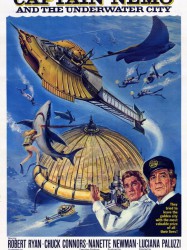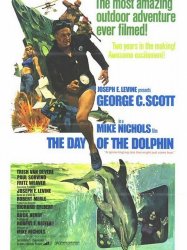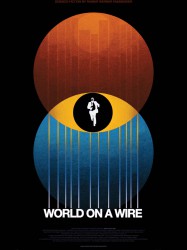Films with theme "Films based on science fiction novels", sorted by revenue
 , 1h45
, 1h45Directed by James Hill (réalisateur britannique), James Hill
Origin United-kingdom
Genres Science fiction, Fantastic, Adventure
Themes Seafaring films, Transport films, Submarine films, Pirate films, Films based on science fiction novels
Actors Robert Ryan, Chuck Connors, Nanette Newman, Luciana Paluzzi, Bill Fraser, Kenneth Connor
The film opens with a mid nineteenth century cargo liner sinking in a storm at sea, in what is presumed to be an Atlantic Gale. As the vessel begins to founder the crew muster the passengers to the lifeboats, one of which capsizes as it is launched, and its passengers are thrown out into the overwhelming seas. Swept below the waves and on the point of drowning, they are rescued by a group of divers who swim up to them to give them air and lead them to the submarine Nautilus.

Colossus: The Forbin Project (1970)
, 1h40Directed by Joseph Sargent
Origin USA
Genres Science fiction, Thriller, Action
Themes Films about computing, Films about mathematics, Politique, Films based on science fiction novels, Political films, Dystopian films, Arme nucléaire, Disaster films, American disaster films
Actors Eric Braeden, Susan Clark, Gordon Pinsent, William Schallert, Georg Stanford Brown, Marion Ross
Dr. Charles A. Forbin (Eric Braeden) is the chief designer of a secret government project that has built "Colossus", an advanced supercomputer to control the United States and Allied nuclear weapons systems. Being encased within a mountain, it is impervious to attack, powered by its own nuclear reactor. When Colossus is activated, the President of the United States (Gordon Pinsent) announces its existence, proudly proclaiming it a perfect defense system.

Assignment Terror (1970)
, 1h25Directed by Hugo Fregonese, Tulio Demicheli
Origin Espagne
Genres Science fiction, Horror
Themes Films about animals, Circus films, Films about computing, Films about magic and magicians, Films based on science fiction novels, Wolves in film, Frankenstein films, Werewolves in film, Vampires in film, Cyberpunk films, Films about extraterrestrial life, Alien invasions in films, Mise en scène d'un mammifère
Actors Paul Naschy, Michael Rennie, Karin Dor, Patty Shepard, Ángel del Pozo, Craig Hill
Aliens, running a traveling circus as a cover, revive a vampire, a werewolf, a mummy and Frankenstein's monster with a plan to use them to take over the world. They want to discover the reason that these monsters are so frightening to Earthlings. They then plan to create an army of such monsters using their findings.

Frankenstein '80 (1972)
, 1h25Genres Science fiction, Horror
Themes Films about computing, Films based on science fiction novels, Frankenstein films, Cyberpunk films
Actors John Richardson, Gordon Mitchell, Xiro Papas, Dalila Di Lazzaro, Dada Gallotti, Luigi Bonos
By day, Dr. Frankenstein (Gordon Mitchell) works innocuously in his lab. But at night, he works to perfect Mosaico (Xiro Papas), a monstrosity pieced together from dead bodies. Once completed, the behemoth escapes from the lab and embarks on a killing spree. Local beauties begin popping up dead, murdered in a variety of gruesome ways, as authorities attempt to stop Mosaico's rampage.

Slaughterhouse-Five (1972)
, 1h44Directed by George Roy Hill
Origin USA
Genres Drama, Science fiction, War, Comedy, Comedy-drama, Fantasy, Historical, Comic science fiction
Themes Medical-themed films, Prison films, Time travel films, Films based on science fiction novels, Comedy science fiction films, Films about psychiatry, Political films
Actors Michael Sacks, Ron Leibman, Valerie Perrine, Eugene Roche, Perry King, Sharon Gans
The film follows the novel in presenting a first-person narrative from the point of view of Billy Pilgrim (Sacks), who becomes "unstuck in time" and experiences the events of his life in a seemingly random order, including a period spent on the alien planet of Tralfamadore. Particular emphasis is placed on his experiences during World War II, including the bombing of Dresden in World War II, as well as time spent with fellow prisoners of war Edgar Derby (Roche) and the psychopathic Paul Lazzaro (Leibman). His life as a husband to Valencia (Gans), and father to Barbara (Near) and Robert (King) are also depicted, as they live and sometimes even enjoy their life of affluence in Ilium, New York. A "sink-or-swim" scene with Pilgrim's father is also featured. The scenes of extraterrestrial life on Tralfamadore feature Hollywood starlet Montana Wildhack (Perrine).

Solaris (1972)
, 2h24Directed by Andreï Tarkovski
Origin Russie
Genres Drama, Science fiction, Adventure
Themes Space adventure films, Medical-themed films, Seafaring films, Transport films, Dans l'espace, Films based on science fiction novels, Films about psychiatry, Space opera
Actors Natalia Bondartchouk, Donatas Banionis, Jüri Järvet, Nikolai Grinko, Anatoli Solonitsyne, Vladislav Dvorzhetsky
Psychologist Kris Kelvin (Donatas Banionis) spends his last day on Earth reflecting on his life while walking by a lake near his childhood home where his elderly father still resides. Kelvin is about to embark on an interstellar journey to a space station orbiting the remote oceanic planet Solaris. After decades of study, the scientific mission at the space station has barely progressed. The crew is sending confusing messages. Kelvin is dispatched to evaluate the situation aboard the ship and determine whether the venture should continue.

The Day of the Dolphin (1973)
, 1h44Directed by Mike Nichols
Origin USA
Genres Drama, Science fiction, Thriller, Action, Adventure, Crime
Themes Films about animals, Seafaring films, Transport films, Cétacé, Films based on science fiction novels, Political films, Mise en scène d'un cétacé
Actors George C. Scott, Trish Van Devere, Paul Sorvino, Edward Herrmann, Jon Korkes, Fritz Weaver
A brilliant and driven scientist, Jake Terrell, and his young and beautiful wife, Maggie, train dolphins to communicate with humans. This is done by teaching the dolphins to speak English in dolphin-like voices. Two of his dolphins, Alpha ("Fa") and Beta ("Bea"), are stolen by officials of the shadowy Franklin Foundation headed by Harold DeMilo (Fritz Weaver), the supportive backer of the Terrells' research. After the dolphins are kidnapped, an investigation by an undercover government agent for hire, Curtis Mahoney (Paul Sorvino), reveals that the Institute is planning to further train the dolphins to carry out a political assassination by having them place a magnetic limpet mine on the hull of the yacht of the President of the United States.

The Sannikov Land (1973)
, 1h32Origin Russie
Genres Drama, Science fiction, Fantasy, Adventure
Themes Inspiré de l'univers des contes et légendes, Films about magic and magicians, La préhistoire, Films based on science fiction novels
Actors Vladislav Dvorzhetsky, Yuriy Nazarov, Oleg Dahl, Georgy Vitsin, Makhmud Esambayev, Nikolai Gritsenko
The exiled settler Alexander Ilyin persuades the goldmines owner Trifon Perfilyev to sponsor the expedition dedicated to the searches of "Sannikov Land", a legendary warm land behind the Polar circle. Hoping that this land could be filled with gold, Perfilyev agrees. Few more daredevils volunteer for the mission. The finally gathered crew consists of Ilyin himself, officer Evgeniy Krestovskiy, Perfilyev's servant Ignatiy, who is given a task of killing every other crew member in case they truly find any gold, and Gubin, a Katorga runaway and a former doctor.

World on a Wire (1973)
, 3h25Directed by Rainer Werner Fassbinder
Origin German
Genres Drama, Science fiction, Thriller, Crime
Themes Films based on science fiction novels
Actors Klaus Löwitsch, Barbara Valentin, Karl-Heinz Vosgerau, Ulli Lommel, Wolfgang Schenck, Ivan Desny
At the Institute for Cybernetics and Future Science ("Institut für Kybernetik und Zukunftsforschung, IKZ"), a new supercomputer hosts a simulation program that includes an artificial world with over 9,000 "identity units" who live as human beings, unaware that their world is just a simulacron. Professor Vollmer (Adrian Hoven), who is technical director of the program, is apparently on the verge of an incredible secret discovery. He becomes increasingly agitated and anti-social before dying in a mysterious accident. His successor, Dr. Fred Stiller, has a discussion with Günther Lause, the security adviser of the institute, when the latter suddenly disappears without trace, before passing on Vollmer's secret to Stiller. More mysterious still is the fact that none of the other IKZ employees seem to have any memory of Lause.

At the Earth's Core (1976)
, 1h29Directed by Kevin Connor
Origin United-kingdom
Genres Science fiction, Fantasy, Adventure
Themes Films about animals, La préhistoire, Films based on science fiction novels, Animaux préhistoriques
Actors Peter Cushing, Doug McClure, Caroline Munro, Cy Grant, Godfrey James, Keith Barron
Dr. Abner Perry, a British Victorian period scientist (Cushing), and his US financier David Innes (McClure) make a test run of their Iron Mole drilling machine in a Welsh mountain, but end up in a strange underground labyrinth ruled by a species of giant telepathic flying reptiles, the Mahars, and full of prehistoric monsters and cavemen. They are captured by the Mahars, who keep primitive humans as their slaves through mind control. David falls for the beautiful slave girl Princess Dia (Munro) but when she is chosen as a sacrificial victim in the Mahar city, David and Perry must rally the surviving human slaves to rebel and not only save her but also win their freedom.

The Island of Dr. Moreau (1977)
, 1h34Directed by Don Taylor
Origin USA
Genres Science fiction, Thriller, Fantastic, Adventure, Horror
Themes Films about computing, Films based on science fiction novels, Cyberpunk films
Actors Burt Lancaster, Michael York, Nigel Davenport, Barbara Carrera, Richard Basehart, Nick Cravat
Crewman Andrew Braddock (York) survives the wreck of the sailing ship The Lady Vain. After seventeen days at sea in a lifeboat, he reaches the shores of an island governed by the mysterious scientist "Dr. Moreau" (Lancaster). Besides Moreau, the inhabitants of the island include Moreau's associate, Montgomery (Davenport), a mercenary; his misshapen servant, M'Ling (Cravat); and a ravishing young woman named Maria (Carrera).

The Amazing Captain Nemo (1978)
, 2h30Directed by Paul B. Stader
Origin USA
Genres Science fiction, Fantasy, Adventure
Themes Seafaring films, Transport films, Submarine films, Pirate films, Films based on science fiction novels, Films set in Atlantis
Actors José Ferrer, Burgess Meredith, Mel Ferrer, Horst Buchholz, Tom Hallick, Burr DeBenning
The story opens with a transmission received by the White House from the renegade Professor Cunningham, who threatens Washington DC with nuclear destruction from a missile fired from his submarine Raven. His extortion demand is one billion dollars in gold bullion. To demonstrate his capability he blows up small island with the Raven's 'Delta beam'. Cunningham, bespectacled and cardigan-clad, is assisted by various androids including a large silver-headed one known as Tor.

The Lathe of Heaven (1980)
, 2hOrigin USA
Genres Drama, Science fiction, Thriller, Fantasy
Themes Films based on science fiction novels
Actors Bruce Davison, Kevin Conway, Margaret Avery, Frank Miller, R. A. Mihailoff
In Portland, Oregon in the near future, George Orr is charged with misuse of multiple prescription medications, which he was taking to keep himself from dreaming; he volunteers for psychiatric care to avoid prosecution, and is assigned to the care of licensed "oneirologist" William Haber. Orr's explanation of his drug abuse is incredible: he has known since age 17 his dreams change reality, and tries to prevent himself from dreaming because he fears their effects.
 , 48minutes
, 48minutesDirected by Roman Katchanov
Origin Russie
Genres Science fiction, Fantasy, Adventure, Animation
Themes Space adventure films, Films based on science fiction novels, Films set in the future, Space opera
Actors Vladimir Droujnikov, Vassili Livanov, Vsevolod Larionov, Rina Zelionaïa
As part of an expedition from Earth on the ship "Pegas", Captain Zelyonyy, Professor Seleznyov and his daughter Alice Selezneva search for new animal species for Moscow Zoo. On the advice of the archeologist Gromozeka they look for with the help of doctor Verkhovtsev, the director of the museum of Two Captains, but the doctor behaves suspiciously: doesn't show them diaries of captains and starts spying on the expedition. On the planet Blukthey make some valuable purchases, among them a Chatterer — the bird belonging to the missing captain Kim. A suspicious fat man, Merry Fellow U, tries to steal a bird. Having listened to the speech of the Chatterer, the crew of "Pegas" heads for system of the Jellyfish. On the road heroes rescue robots of the planet of Shelezyak from diamond dust, admixed in greasing.
 , 1h32
, 1h32Directed by Piotr Szulkin
Genres Drama, Science fiction, War, Thriller, Comedy, Horror
Themes Space adventure films, Mars in film, Films based on science fiction novels, Films set in the future, Films about extraterrestrial life, Space opera, Films about extraterrestrial life, Alien invasions in films, Disaster films
Actors Krystyna Janda, Mariusz Dmochowski, Stanisław Tym, Jerzy Stuhr, Marek Walczewski, Stanisław Gawlik
The film starts from the position close to the literary inspiration suggested in the title, but rather from developing it in the same manner as the novel it is used as a witty commentary on the political situation of Poland in the period of the Polish People's Republic.
 Connection
Connection